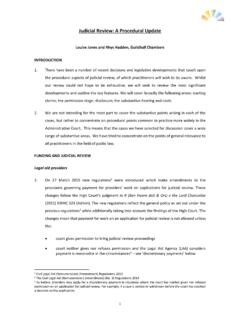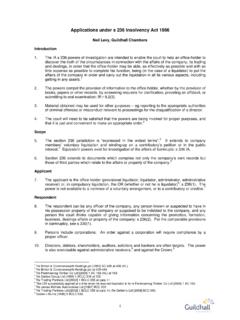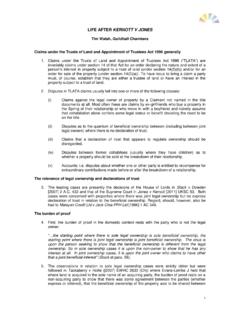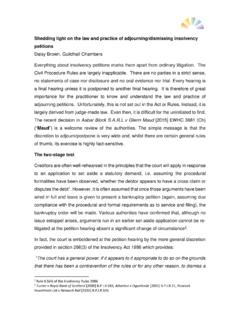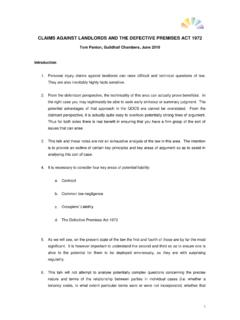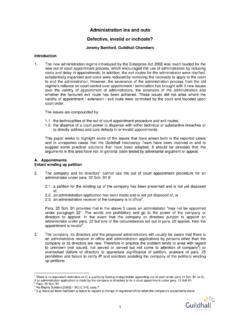Transcription of Good Faith in English Contract Law - Guildhall Chambers
1 GOOD Faith IN English Contract LAW. Introduction Many foreign jurisdictions of both civil and common law traditions have long recognised an obligation to act in good Faith when making and performing contracts. Historically, this was not an approach recognised by the English courts. Rather, English law was said to have "committed itself to overriding principle [of good Faith ] but has developed piecemeal solutions in response to 1. demonstrated problems of unfairness". The absence of a general, overriding duty to act in good Faith does not however, mean that this is not an issue with which English courts have had to grapple.
2 EU legislation frequently imposes such 2. a duty on contracting parties, whilst the common law also recognises a duty to act in good Faith in certain specific types of Contract eg contracts of employment or insurance. What is more, the Courts will enforce express contractual terms that parties are to act in good Faith and it would now seem in light of the decision in Yam Seng Pte Ltd (a company registered in Singapore) v 3. International Trade Corporation Ltd ('Yam Seng') that they are also willing to imply such terms into commercial contracts in certain circumstances.
3 This article focuses on the last two of those eventualities, namely express and implied contractual obligations to act in good Faith , and it does so with reference to a number of decisions of the last two years. What is good Faith ? Perhaps the first question to ask is exactly what is good Faith '? Unfortunately, the answer is that it 4. depends. In Berkeley Community Villages Ltd and another v Pullen and others, Morgan J was required to construe a clause in the following terms: In all matters relating to this agreement the parties will act with the utmost good Faith towards one another and will act reasonably and prudently at all times'.
4 This he concluded provided for an: "obligation to observe reasonable commercial standards of fair dealing in accordance with [the parties'] actions which related to the Agreement and also requiring faithfulness to the agreed 5. common purpose and consistency with the justified expectations of the First Claimant". 1. Interfoto Picture Library Ltd v Stiletto Visual Programmes Ltd [1989] QB 433at 439. 2. Eg. Unfair Terms in Consumer Contracts Regulations 1999, reg 5(5) which give effect to a European directive; Financial Services Distance Marketing Directive 2002/65/EU; see Chitty on Contract Law (31st ed), Vol 1 at para 1-043.
5 3. [2013] EWHC 111 (QB). 4. [2007] EWHC 1330 (Ch). 5. ibid. at [97]. 6. In CPC Group Ltd v Qatari Diar Real Estate Investment Co Vos J (as he then was) held that an obligation to act in good Faith precluded a party from cynically resorting to the black letter of the 7. law. He also found that it required: observing reasonable commercial standards of fair dealing, being faithful to the agreed common purpose, and acting consistently with the justified expectations 8. of the parties. Interestingly, Vos J also held that it did not require a party to subordinate their self interest in the 9.
6 Same way that a fiduciary would. A similar point was made in Gold Group Properties Ltd v BDW. 10. Trading Ltd (formerly known as Barratt Homes Ltd) where it was held that whilst good Faith required the parties to act in a way that will allow them both to enjoy the anticipated benefits of the Contract , it did not require either party to give up a freely negotiated advantage embedded in the 11. Contract . More recently in Yam Seng Leggatt J emphasised' that ".. the content of the duty to perform a Contract in good Faith is dependent on context".
7 However, in the Judge's view there were at least two aspects' to good Faith which he drew out from some of the aforementioned authorities. The 12 13. first was "honesty" and the second, was "fidelity to the parties" bargain'. Leggatt J also held that the test is "objective in the sense that it depends not on either party's perception of whether particular conduct is improper but on whether in the particular context the 14. conduct would be regarded as commercially unacceptable by reasonable and honest people". In 15. doing so, he relied on the decision in Royal Brunei Airlines v Tan.
8 The importance of context has been emphasised in a number of the more recent authorities. The Court of Appeal in Mid Essex Hospital Services NHS Trust v Compass Group UK and Ireland Ltd 16. (t/a Medirest) (the Medirest Case) held that the content of the duty of good Faith is heavily 17 18. conditioned by context. In Greenclose Ltd v National Westminster Bank plc Andrews J DBE. described context' as being vital' whilst in TSG Building Services plc v South Anglia Housing Ltd Akenhead J pithily described the case as encouraging both "a textual but also a contextual 19.
9 Interpretation of commercial contracts". 6. [2010] EWHC 1535 (Ch). 7. At [67]. 8. At [246]. 9. At [67]. 10. [2010] EWHC 1632 (TCC) [91]. 11. ibid. at [91]. 12. [2013] EWHC 111 (QB) at [135]. 13. ibid. at [139]. 14. ibid. at [144]. 15. [1995] 2 AC 378 . 16. [2013] EWCA Civ 200. 17. At [109] per Jackson LJ and see also [150] per Beatson LJ. 18. [2014] EWHC 1156 (Ch) [150]. 19. [2013] EWHC 1151 (TCC) at [36]. Whilst the context will determine the content of the duty, the authorities suggest that the following specific duties may be found within a general duty of good Faith .
10 In Yam Seng, a duty not to 20. knowingly provide false information was held to exist. In Bristol Groundschool Ltd v Intelligent 21. Data Capture Ltd and others Richard Spearman QC (sitting as a deputy High Court judge). applied Yam Seng and held that: good Faith extends beyond, but at the very least includes, the 22. requirement of honesty'. 23. In the recent decision of D&G Cars v Essex Police Authority, Dove J stated that he used the word 24. integrity' in much the same way as Leggatt J had used the phrase good Faith in Yam Seng.

